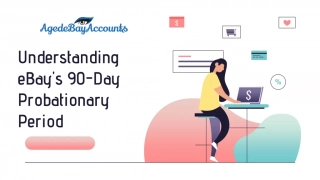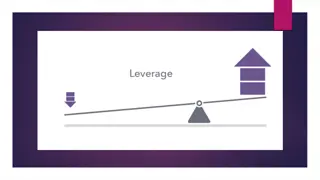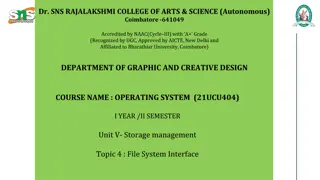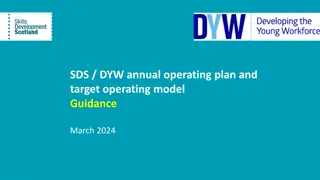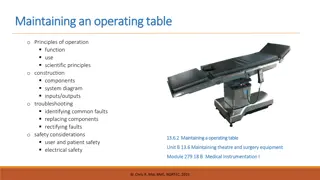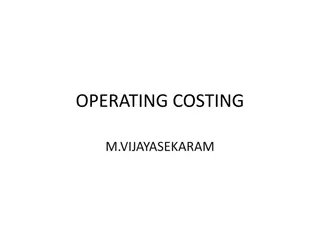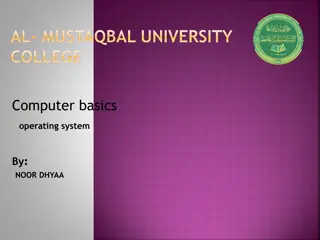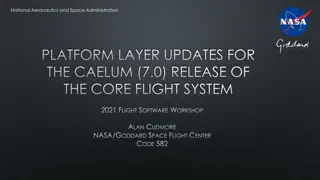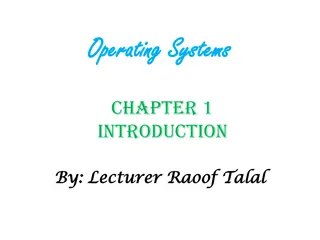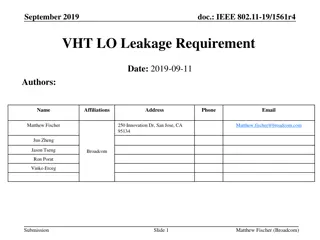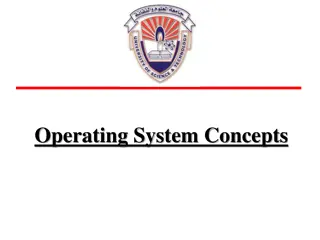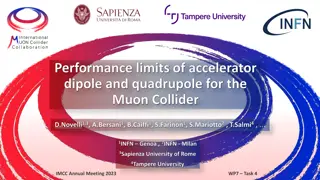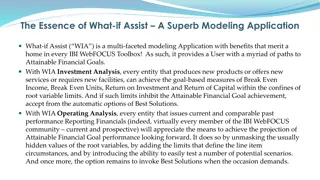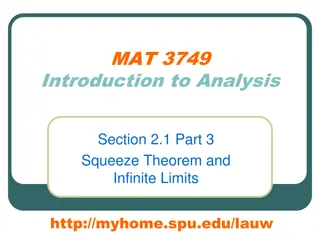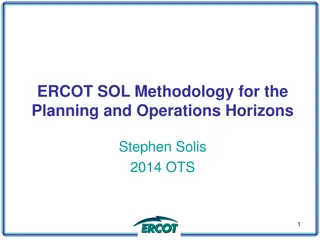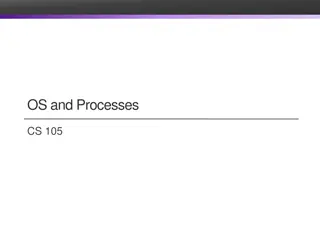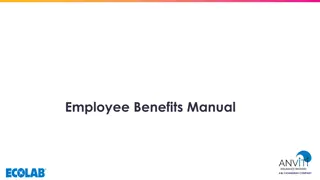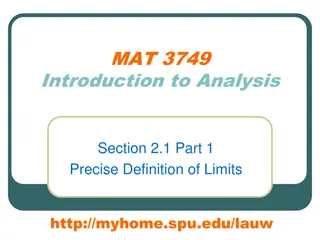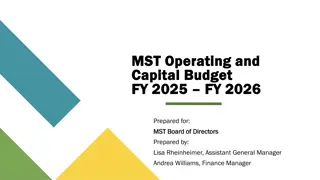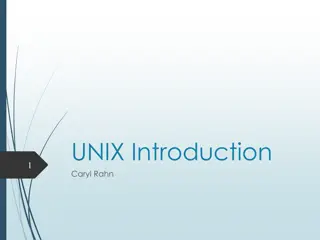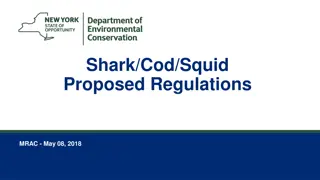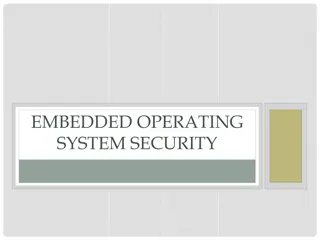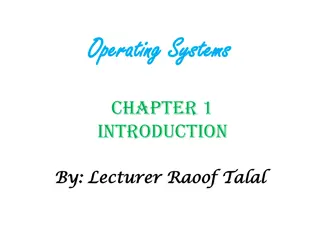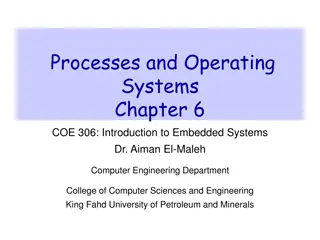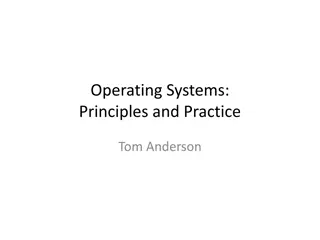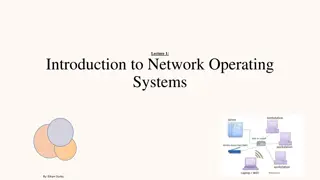Understanding eBay's 90-Day Probationary Period
eBay, the global online marketplace, offers immense opportunities for sellers to reach a wide audience and expand their businesses. \n\nHowever, it imposes ebay selling limits on new ebay sellers account to ensure a manageable growth trajectory and maintain excellent service standards. \n\nIn this g
0 views • 10 slides
Understanding Leverage and Operating Leverage in Financial Management
Leverage in financial management refers to using assets or funds with fixed costs to analyze the impact of debt and equity mix on shareholder returns and risk. Operating leverage focuses on leveraging fixed operating costs to amplify profit changes with sales variations, measured by the degree of op
2 views • 6 slides
Operating Systems
An operating system is a crucial program that manages all other programs on a computer. It handles tasks like input recognition, file management, and device control. There are different types of operating systems such as single-user, single-task systems, multi-user, multi-task systems, real-time ope
6 views • 11 slides
Understanding File System Interface in Operating Systems
The file system interface is a crucial aspect of any operating system, providing users with a method for storage and access to data and programs. It comprises files for data storage and a directory structure for organizing and managing files within the system. File attributes like name, identifier,
0 views • 8 slides
Exploring Population Growth and Resource Limits Through 'Limits of Growth' Perspectives
This collection delves into the causes and solutions of population growth and resource limitations based on the insights from 'Limits to Growth' publications. The content covers topics such as overshoot, exponential growth, system dynamics, and strategies for transitioning to a sustainable system. I
0 views • 28 slides
SDS/DYW Annual Operating Plan and Target Operating Model Guidance - March 2024
This guidance outlines the development of an Annual Operating Plan and Target Operating Model (TOM) to enhance collaboration and improve outcomes for young people. It emphasizes aligning planning activities, co-designing learner experiences, and maximizing collective resources through strategic part
1 views • 9 slides
Maintaining an Operating Table: Principles and Functions
An operating table system comprises three components - the table column, table top, and transporter, each available in different versions for various surgical disciplines. Stationary tables are anchored to the floor, offering flexibility to adapt to patient needs. Mobile tables provide maneuverabili
0 views • 12 slides
Understanding Operating Costing in Service Industries
Operating costing is a method utilized by service-oriented businesses to ascertain the costs of providing services. Industries such as transportation services, welfare services, utility suppliers, and municipal services find operating costing beneficial. The method involves classifying costs into th
0 views • 6 slides
Understanding Operating Systems: Basics and Types
An operating system is essential software that manages a computer's hardware and software, allowing users to interact with the computer. Learn about the functions of an operating system, its importance, types available such as Microsoft Windows and macOS, and how they impact different devices. Disco
1 views • 11 slides
NASA Platform Layer Updates for the CAELUM (7.0) Release
The National Aeronautics and Space Administration (NASA) discusses platform layer updates for the CAELUM (7.0) release of the Core Flight System in the 2021 Flight Software Workshop. The platform layer consists of the Operating System Abstraction Layer (OSAL) and Platform Support Package (PSP), whic
1 views • 20 slides
Understanding Operating Systems: Introduction and Functions
An operating system plays a crucial role in managing computer hardware and facilitating user-computer interactions. It serves as an intermediary between users and hardware components, ensuring efficient resource allocation and control. The operating system coordinates the use of hardware resources b
5 views • 16 slides
Proposed Relaxation of VHT LO Leakage Limits in IEEE 802.11-19/1561r4
VHT LO Leakage limits in the IEEE 802.11-19/1561r4 standard are deemed unrealistic under reduced TX power scenarios. This document proposes a relaxation of these limits under certain conditions, suggesting amendments for a more realistic approach to addressing LO leakage. The proposal aims to ensure
0 views • 13 slides
Understanding Operating Systems: Functions and Evolution
Operating systems are essential software that enable computers to function effectively by managing hardware resources and facilitating communication between applications and hardware. This article covers the basics of operating systems, their structure, evolution, functions, and types. It also explo
2 views • 23 slides
Understanding Operating System Concepts: Lecture Overview and Services
Exploring the lecture content on operating system concepts, structures, services, system calls, and file manipulation. Delve into the importance of operating system services, error detection, program execution, I/O operations, protection, security, and resource allocation in operating systems. Learn
4 views • 26 slides
Performance Limits of Accelerator Dipole and Quadrupole for Muon Collider
Utilizing Python code, the study analyzes the limits of accelerator dipole and quadrupole for the Muon Collider. Analytic formulas are implemented to assess the behavior of these components based on critical current density, operating temperatures, and superconductor materials. The study explores li
0 views • 17 slides
Management Plan for Queen Conch Fishery in St. Croix, USVI
Regulatory Amendment 2 aims to establish coherent regulations for the commercial and recreational harvest of queen conch in the U.S. Caribbean exclusive economic zone and USVI territorial waters. The proposal addresses the compatibility of commercial trip limits and recreational bag limits to enhanc
0 views • 7 slides
A-29 Emergency Procedure: Engine Limits Exceeded Revision 19
In case of engine limits exceeded in A-29 aircraft, pilots must follow specific emergency procedures to ensure safety. The procedure outlines steps like monitoring engine parameters, adjusting throttle, and possibly switching to manual mode if limits persist. The ultimate goal is to land the aircraf
0 views • 4 slides
Unlocking Attainable Financial Goals with What-If Assist Modeling Application
A comprehensive modeling application, What-If Assist (WIA), provides a multitude of paths for achieving financial goals through Investment Analysis and Operating Analysis. By setting limits and exploring various scenarios, users can reach Break Even Income, Break Even Units, Return on Investment, an
3 views • 21 slides
Understanding the Squeeze Theorem in Analysis
Explore the Squeeze Theorem and its applications in infinite limits, one-sided limits, and limits at infinities. Discover the core concepts and examples to grasp the importance of this theorem in analysis and calculus.
0 views • 29 slides
Proposed Amendments to City Campaign Finance Code
Proposed amendments to Chapter 18 of the City Campaign Finance Code aim to align existing contribution limits and regulations with a four-year election cycle. Changes include clarifying reset times for contribution limits, adapting rules for year-round fundraising, and shifting limits to $5,000/$10,
0 views • 12 slides
Understanding ERCOT SOL Methodology and NERC Standards
Explore the ERCOT SOL Methodology for Planning and Operations Horizons as outlined by Stephen Solis in 2014. Learn about System Operating Limits, Interconnection Reliability Operating Limits, and the relationship between ERCOT and Transmission Planners/Operators. Discover the purpose, changes made,
0 views • 33 slides
Introduction to Operating Systems and Processes
In this informative content, we delve into the fundamental concepts of operating systems (OS) and processes. Operating systems are essential software that manage a computer's resources for users and applications. We explore the core functionalities of an OS, such as resource allocation, isolation, c
0 views • 41 slides
Understanding Levy Limits and Net New Construction in County Budgeting
State budgeting in 2005-2007 introduced levy limits tied to net new construction growth rates, impacting property tax levies. The law included a guaranteed 2% increase which later varied. Assessed values, equalized values, and net new construction play key roles. Options like exceeding levy limits b
0 views • 9 slides
Comprehensive Employee Benefits Manual
This Employee Benefits Manual covers Group Medical Benefits, Employee Medical Plans, Employee Base Plan, Employee Top-Up Plan, and Parents Base Plan. It includes details on coverage, policy periods, insurance companies, room rent limits, sum insured limits, members covered, age limits, co-payments,
0 views • 30 slides
Understanding Precise Definitions of Limits in Analysis
Delve into the precise definitions of limits in mathematical analysis, exploring left-hand limits, right-hand limits, limit of a function, and more. Gain insights into how limits are defined and understood in the context of mathematical functions.
0 views • 28 slides
MST Operating and Capital Budget FY 2025 Summary
The MST Operating and Capital Budget for FY 2025 focuses on maximizing revenues, increasing bus advertising rates, promoting transit services, seeking grants for capital projects, and maintaining stable staffing levels. The budget priorities also include operating a Better Bus Network at Board-adopt
0 views • 10 slides
Understanding UNIX Operating System
UNIX is a versatile operating system that enables multi-user access, multitasking, and portability across various computing environments. It serves as the foundation for many modern operating systems and has influenced concepts incorporated in Microsoft Windows and DOS. The UNIX system comprises dis
0 views • 51 slides
Understanding Revenue Limits and Calculation Process in School Financial Management
This educational material covers topics such as revenue limits, the components within revenue limits, what falls outside of the revenue limit, and a four-step process for revenue limit calculation in the context of school financial management. It includes detailed information on the regulation of re
0 views • 34 slides
Understanding Types of Municipal Debt and Debt Limits
Explore the various types of municipal debt such as General Obligation (GO) Debt, Revenue Debt, and Special Assessment Debt. Learn about Lease-Purchase Agreements, Certificates of Participation (COPS), Federal and State Loans, Refunding Bonds, and short-term borrowing options like TANs, BANs, RANs,
0 views • 10 slides
Introduction to Linux: Course Overview and Objectives
This introduction to Linux course provides a comprehensive overview of operating systems, including the history, variations, user interface, and essential commands. The course is designed with lectures, labs, and exercises to help participants gain a better understanding of Linux and its practical a
0 views • 77 slides
Proposed Regulations for Shark, Cod, and Squid Management by MRAC
The proposed regulations aim to ensure consistency between federal and state fishery management plans for Coastal Sharks, Atlantic Cod, Longfin, and Illex squid. Specific measures include setting size limits for shark harvest, revising commercial size limits for Atlantic cod, and implementing trip a
0 views • 12 slides
Understanding Embedded Operating System Security
Embedded operating systems are designed for special purposes with limited resources and small sizes, found in various devices like ATMs, smartphones, cars, and more. Common operating systems include VxWorks, Windows, QNX, and SCADA, with different applications and requirements. Windows CE stands out
0 views • 21 slides
Understanding Operating Systems: An Introduction and Overview
An operating system is a crucial program that manages computer hardware and serves as an intermediary between users and hardware. This chapter explores the role of operating systems in a computer system, covering components like hardware, application programs, and users. It delves into how operating
0 views • 16 slides
Introduction to Processes and Operating Systems in Embedded Systems
Processes and operating systems play a crucial role in building complex applications on microprocessors, offering flexibility to meet timing requirements. The operating system (OS) manages processes by providing mechanisms for switching execution between them. Real-Time Operating Systems (RTOS) are
0 views • 65 slides
Aerobic Gymnastics Competition Guidelines and Rules
The guidelines for aerobic gymnastics competitions include compulsory elements, categories, competition spaces, deductions, and specific rules for different age groups. The competitions have specific parameters for elements allowed, lifting, floor elements, music length, maximum difficulty elements,
0 views • 17 slides
Understanding Confidence Limits in Statistical Analysis
Confidence limits are a crucial concept in statistical analysis, representing the upper and lower boundaries of confidence intervals. They provide a range of values around a sample statistic within which the true parameter is expected to lie with a certain probability. By calculating these limits, r
0 views • 4 slides
Understanding Operating Systems: Principles and Practice in CSE Curriculum
Dive into the world of operating systems through the lens of "Operating Systems: Principles and Practice" by Tom Anderson. Discover how this course fits in the UW CSE curriculum, covering systems programming, operating system interfaces, and distributed systems. Explore the project work on building
0 views • 21 slides
Implications of Raising Speed Limits to 75 mph and Beyond: Research Summary
This research project delves into the safety effects of increasing speed limits to 75 mph and higher, providing key findings from literature reviews, state assessments, and operational analyses. It aims to guide highway agencies in understanding the safety implications of elevated speed limits, exam
0 views • 27 slides
An Overview of Network Operating Systems and Multitasking
This informative content discusses the services of network operating systems, multitasking concepts, essential components, client and server software elements, and network services. It explains the two forms of multitasking - preemptive and nonpreemptive - and their functions within operating system
0 views • 48 slides
Overview of Network Operating Systems and Their Features
Network operating systems are essential software that manage computer resources and provide services for programs. This lecture covers the types of computers in a network, features of operating systems such as process and memory management, disk and file systems, and networking capabilities. Underst
0 views • 27 slides
